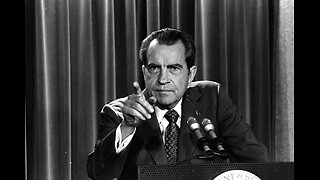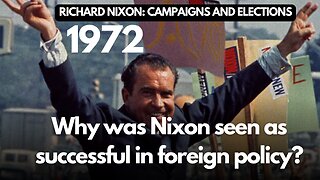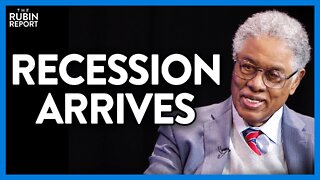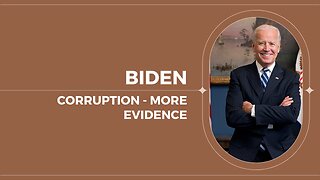Dwight Chapin, Longtime Personal Aide to President Richard Nixon, Shares his Story
Doug speaks with Dwight Chapin, special assistant to former President Richard Nixon.
(MACHINE GENERATED)
Doug Truax: Welcome to the First Right podcast, a weekly conservative new show brought to you by Restoration of America. I'm your host, Doug Truax, founder, and president of Restoration of America. Today. We're blessed to have a super interesting guest Dwight Chapin, longtime personal aide to former president Richard Nixon. Mr. Chapin witnessed a lot of history up close and has a new book out that tells that story. All right, Dwight, thanks so much for coming on and being on the show.
Dwight Chapin: Well, terrific, Doug. Nice to be with you.
Doug Truax: All right. So a great new book out a really good, interesting stuff before we get to that and your life as an aide and all the, all the time you had in the white house. Just give us an idea of what your life has been like after the white house up to now. What led to you writing the book? That kind of thing.
Dwight Chapin: Okay. Terrific. Well, after leaving the white house, I went to the United Airlines and I was there and then ended up being indicted. So I had to leave. It was a public company after I took care of my obligation to the government and served my time in prison. I published a magazine. Believe it or not, the name of the magazine was success. It was located actually in Chicago and owned by w Clement stone, a philanthropist and w a wealthy insurance man there in Chicago. And I published that magazine for 13 years and then left and was moved out to Asia to run the Asian operations of hill and Knowlton, which was a huge public relations company. I did that for another six or seven years, and then decided to start my own business. I had my own company for 30 years and I did strategic marketing and counseling to corporations and to CEOs and, and anyone that wanted to use my services.
I decided to write the book for a couple of reasons. Number one, I wanted my family to know and understand what had happened to me, why, why it was that I had to go to prison and what that was all about. And I also wanted to put down because I was one of the few remaining Nixon people from the white house years, I wanted to put down what I remembered about the man and about the era that we all live through. And it was important for me to do that because I, I had come to the conclusion that people thought there were only two things about Richard Nixon, either China or Watergate. And there was much more to the man and I wanted to get that onto the public record and do what I could to have him better understood by, by the population.
Doug Truax: Wonderful. Now that's, that's really important to get down because you're right. So many people now it's all just Watergate. It's like, no, no, no. There was a lot of remarkable things about the man and I'm appreciative of you doing this. So if you go back, back back, how did you get to be his aide? How to tell us that story, how that came to be, that he picks you and there you are.
Dwight Chapin: Yeah. Well, Doug, I was a young man at the university of Southern California. And between, you know, during the summer, the rule in my family was you always had a summer job and I didn't have to have one in 1962. And that was the year that Nixon was running for governor out in California. He had lost the Jack Kennedy in 1960. So he was back out in California in 62. And dad said, I know someone at the Nixon headquarters, maybe, maybe with your interest in politics, you could get some kind of a position there. And I went down and I was interviewed by a young brew cut guy, 32 years old, who was a campaign manager and his name was Bob Haldeman. And as you may know, Bob ended up eventually be Nixon's chief of staff. But that, that was the start of my association with Richard Nixon in 1962.
Then I, I moved east and around 1965 and I volunteered to go down to his office in the evening. Of course he, I should say that he had lost to pat brown there in that race for the governorship. So he moved back to New York and I would go down after hours and help out at the law firm answering correspondence and the person teaching me how to do that was none other than Mrs. Nixon. And she really got to know me. And I think the key to how I ended up being Nixon's personal aid ties, right to Mrs. Nixon. She got comfortable with me. She trusted me. She had doubtedly passed that word onto her husband, Dick Nixon, and said, you know, maybe you ought to look at this man, young man as a possible aid. He did, he hired me and I started working for him in 1967. It was just the two of us traveling around the country. And then of course that matured into a, a presidential type campaign. And I served by his side all the way through the election itself and then up to the inauguration. And then he invited me to join the staff white house.
Doug Truax: Wow. Great story. And so how often is it? It's the wife's influence sometimes, right? The spouse says if you get in good there, right
Dwight Chapin: By, I mean, that's my theory on it. When you're working for people like this, the important thing is trust you, you have to be able to trust the people that are working with you. That's another thing about my book. I didn't, I didn't write my book 10 minutes after I left the white house, I've waited almost 50 years to write this book. It gives it a whole different perspective. And the, and the motivation of the individuals that are writing the books. I mean, when they do it immediately, it's either for profit or they're worried about, you know, using kind of using the book to land a job or something. Right. When I avoided all that by waiting so many or
Doug Truax: Yeah. Good for you. I appreciate you doing that. I know our audience does as well. Cause that is in this day and age, it is getting very annoying. When you see somebody, like you said, quickly write the book so they could make a buck or whatever they're doing. They've got their vendetta or whatever. It's, it's, it's not, it's not good. So that's, it's good for you to be, be kind of old school this way, right? The way it used to be, you know, loyal and trustworthy and all that. So good for you on that.
Dwight Chapin: Well, I may be old school, but you know, it's one of the things I think that we've got to be focusing on the country today and that's this whole level of trust. We've lost respect of our elected officials. We've w w th there is no trust factor, particularly among institutions. And this, this is huge. If we're going to make this democracy continue and work the way that the founders had in mind, one of the things we've got to be able to do is to trust not only the institutions, but the people that are in these leadership positions.
Doug Truax: That's right. That's right. Well, we'll get to in a second, too, about the media back in your day, but I interview a lot of media people, you know, that are obviously conservative, but they can start to identify the moment when they realized that the most of the media was Democrat and running against, you know, the conservatives. And so we've had this, we, when we lose trust in the media, then it, then the accountability starts to slip all over the place. So it's, it's, I couldn't agree with you more. It's a, it's a difficult time. So w we'll hopefully get back to a better place on that. So if you're, so you're the aid and I was in the army for a while. I was an aid to a general for a year. And so I know a little bit about that, and I understand, you know, when you're an aid to a politician or a CEO or military officer, you're going through the day to day, and you're there, you know, bearing the brunt of the, of the difficult situations. I mean, there's some good things, obviously, but some the, the brunt of the difficult situations, and it can become quite a pressure cooker. So talk about that a little bit and how you, how you, how that, how you handled that was that different than you thought it was going to be. Any, anything you care to share about that side of the job?
Dwight Chapin: Right. Well, first of all, I had no idea how it was going to be because I had never been there before, but I, the good Lord gifted me with a, an intuitive sense, I think, and I, as I got to know, Mr. Nixon better and better, I understood what it was that made him perform at his peak level. And my, my job really was to make sure that within the, I let's use the term bubble, that, that space immediately around him, as we travel wherever we went and so forth, that, that he w that he had everything he needed in order to perform at his highest, highest, possible level. So that meant managing everything from the phone calls to the visitors coming in to seam, and it meant making sure that he had all of his preparatory materials available. It meant sh it meant saying no to a lot of people that wanted to give him advice or come in to see him when we were on the road.
So, but, but, but the idea in terms of the responsibility I had was his operation, making sure that he had everything that he needed. Some people in recent years, I noticed have referred to this more as a body man, or use that, that kind of terminology. I think I was fortunate. I got in ahead of that. I wasn't, I wasn't a senior advisor, anything like that, but I, I was given a lot of latitude to make determinations on what would be appropriate for him to do and a given situation, and to help shepherd him through that time. And I, I have nothing, but the fondest memories of, of the campaign time at it changed when we got to the white house, there's a heck of a difference between running for office and then government. So what once we made that transition into the governing haven't mined, this is a man that had been in the house of representatives, the Senate. He had been vice president under Eisenhower, great years. He knew what he wanted it and how he wanted things to work. Plus he had an incredible competent chief of staff and Bob Haldeman, who was a managerial genius. And so that really helped me kind of transition from the campaign type operation, into the governing type situation that we have.
Doug Truax: Right. It's a good transition. Yeah. That's I can't, I, I can't imagine the difference between campaign to governing. And I've always thought that I see the, the ramp up in the campaign and it's so, you know, frenetic and everything. And then all of a sudden, not duration. Now you got to get to governing and it's just like a total. It seems like it'd be a total 180, but you know, you gotta be ready to handle it. You see these guys take that time to ramp up, right, until it to inauguration day,
Dwight Chapin: It's a, it's about policy. And it's about getting a law. Let me make a point. I was watching the other day and preparation for the publicity side of my book. I was going back through all of the video of the China trip. I had been very involved with Dr. Kissinger and putting together the trip to China. And what I came across that really got my attention was that the day that Nixon left for Beijing, he walked out of the south protocol article of the white house toward the helicopter, and he stopped. And he said, he went up to the microphone and he said, I want to thank the majority leader, Mike Mansfield for being here this morning and speaker Carl Albert, and the other bipartisan members of Congress. And that reminded me that when he took office, he said that he wanted to have the bipartisan leaders of Congress come to the white house no less than once a week to meet with him on policy.
And they did that for month in, month out, the leaders would come and they would meet with him and they got so much done the next and their accomplishments or the number are huge. How did he, why did that happen? Because these men talk to one another in today's world. If the bipartisan leaders go up to meet with the president of the white house, it's national news, right. We're back there. They were going every week, they were sitting down, they were talking about what was in the best interest of the country and they were acting on it. It was a hell of a different types of situations.
Doug Truax: Yeah. Big changes. Absolutely. And I was going to ask you about the China piece. So you were heavily involved in planning that, and so what, what's your take then now on our relationship with China nowadays?
Dwight Chapin: Well, I, I think if president Nixon were alive and with us, I mean, he, he let me make a point. He said 50 years ago in 1972, he said in 50 years, which is right now, we are going to be adversaries. And we have to be able to talk to one another. That was one of the reasons he stated that he went to China. So here we are 50 years later and we've gotta be able to talk to one another. The bottom line, I think though, is that as this whole relationship with China developed, we left the commerce side of things, the, the doing business side of things, the economics side of it take the lead with our business people and so forth. And we, we took and put into a second theory position, the strategic interests of the nation itself. And I think that needs to be flipped.
There's no question that we can work with China. We can do, we can have trade with China and so forth. It's got to be on a level playing field and it's gotta be fair. And we gotta stick to that. But as a nation, we need to take and put our national interests ahead of the commercial entrance. And that just has to be a rule of thumb and our business people may not like that, but it's something that they've got to accept, because if we do not do that, we are going to see China, not only undermine us, but take over and large sectors of the world. And I don't believe we should do that because that's your is not in our national interests either,
Doug Truax: Right. That's such a wise point about having the national interest first and what's happened. I think a lot of the, I'm a business guy myself too, in addition to politics, but watching the capitalists turn into, you know, such globalists in the sense that it feels like so many American business people would be willing to sell out their country to make an extra dollar and, you know, wherever that goes and whatever. And, you know, I think Trump tapped into this too, and it's a, it's a, that kind of sell out mentality and it's kind of the way it just was. It has been allowed to grow. And to your point, we need to go back to the days like, Hey, before we do anything, let's think about our own country and our own people first. It doesn't mean we're not going to go there and, and, you know, have a relationship with them and trade with them and all that. But let's begin in that spot because if we don't do that, then you're right. It just kind of takes on a life of its own.
Dwight Chapin: Right. In a moment of frustration. One time I remember, and this is, this is an incredible quote. I, Nixon was so upset about the business person's interest in the almighty dollar. He said, Dwight, you know, there's no one as small as a big businessman. I mean, they do not get the big picture. If we do not keep this democracy in shape and having it operate and the free enterprise system operating in a fair way and so forth that they're, they're not going to have the profits and their mentality is going to shift. And I think we've seen part of that happened.
Doug Truax: That's right. That's right. Yeah. It's been hard to watch in our country, especially the middle lower income, you know, the closed factories. I mean, here in Illinois alone, I mean, there's just all these great towns, Rockford, Decatur, they used to do great with manufacturing places. They're just devastated.
Dwight Chapin: Yes. We have a lot tremendous amount of work to do in that area. And, and of course, as you know, Doug, there's, there's nothing that does a man good, better than the dignity of work for they, where they're providing for their family. And so for them, you know, our, our handout mentality is, is any thing. And that denominator, it just does not work and we can't afford it either. So we've got to shift that. And on that subject, I really feel that there's a tremendous amount of work that needs to be done in the school systems and that the educational side of this whole ledger we have got to, we've got to be teaching people why this is so, and we're not doing that.
Doug Truax: That's right. There's a lot of things that are wrong today. We have a lot of, it's a difficult time, isn't it? Oh my gosh.
Dwight Chapin: But, but let me say that there may be a lot of things wrong, but I wish I were 22. Again, I wish I was going to be around for the next segment. This, this ride that we're about ready to come in to, or approach has got all these challenges, but what a great time to be alive, what a great time to be solving these problems.
Doug Truax: That's right. That's right. Amen to that. And I always tell people, no matter how bad it gets right now, would you rather live in this time in this country or some other time in some other country, you know, you go back a couple of centuries and you know, this is still pretty good deal. We just got to work it out, you know?
Dwight Chapin: Yeah. Part, part, part of Nixon stump speech back in 1968 was, he said, folks, he says the traffic's all one way nobody's, nobody's trying to leave here.
Doug Truax: That's right. That's right. You got that. Right. It's still the same situation. So, okay. Well, speaking of interesting times, so on the media piece, and then also the, the slanting of the media, and then also the slanting of the DOJ FBI. So we've got the Ray to Mar-a-Lago when you were in your boss was treated unfairly many times and there was, there was issues there as well. So what's your take on what's going on right now with the department of justice and where this is going with Trump and everything.
Dwight Chapin: Yeah. So I, I really do not know. I don't believe any of us know as of this moment exactly what that warrant said. I happen to be a friend of David Varios. He was the former archivist of the United States, a Democrat, but a terrific guy. I had worked with him on the renovation of the Nixon library. And he, he's the kind of man that I, that I know that if there was a issue on getting the documents from, from president Trump, that, that he was the kind of man that would negotiate and have lawyers go meet with the lawyers. And eventually they would come to a conclusion. I think that if the attorney general and the director of the FBI went to that judge in Florida and, and pushed for this going after these documents at Mar-a-Lago and, and seize them just because there were documents there, it is, to me outrageous.
Now it may have been wrong for president Trump to have those documents there. But, but again, that was a negotiation type thing. And you do not take and do an FBI raid on any former president. I don't care if he's a Republican Democrat or whatever. It's not what we should be doing. So a real critical eye has to be cast on this. We do need to know what happened, and we need to know the specifics. And I think the longer that the FBI takes and the department of justice of clarifying this, now I know when you're doing investigations, you, you need to keep them curtailed and confidential until you get to the end of the line. But this kind of qualifies for a special consideration in my mind, because the longer they leave the people out there speculating the worst. All of this speculation is going to get, and it does not work in the favor of our democracy.
Doug Truax: That's right. It's a dangerous precedent. And we can not go down this path. I just, yeah. Nobody wants to see this. Even people on the left are saying now, you know, we, we need to be thinking about this and, and, and not doing anything like this again, but nobody nobody's really stopping them. So I don't know what they're gonna do next, you know?
Dwight Chapin: All right. And I mentioned about the media side of this brochure, I gave a talk on it's part of you can get it on C-SPAN. I gave it on the, at the library of Congress on June 17th on the anniversary of the break and Watergate. And I said, Watergate could not happen today. I mean, back in the old days, when Watergate happened, we had ABC, CBS and NBC. We had Walter Cronkite, John chancellor and Howard K Smith. We had no blogs. We had no talk radio. We had no cable television systems. We had none of that. And I would venture to say that the reason that we have such a 50 50 in the country now is the least, the thing is competitive. At least the conservative side of this equation is being heard. And, and, you know, you're part of that. And this is incredibly important. Back in the Nixon days, we didn't have that, right. We had to fight this thing all ourselves. And we were up against a democratic house, a democratic Senate demo, democratic oriented, investigated prosecutors, and a media that was slanted toward the Democrats. So we were really up against it. And I don't think if it happened, if Watergate were to happen in today's world, that Nixon would ever have to resign.
Doug Truax: Oh, that's a really interesting point. And it goes to the perspective in your reference point to the time you're living in where we might think, oh, we got so bad, but like what you just said, there are a lot of emerging, you know, conservative, well already established conservative outlets and more emerging, which helps level the playing field, right,
Dwight Chapin: Where we're fighting, we're finding, and as has been made by any intelligent conservatives, we, we need to be encouraging Republicans to get Republican in particularly conservatives to get involved, starting at the school board level, the local community level. We need to get in there and, and start weighing in. The Democrats are very good at that. They have done it for years. They, they make a profession out of it. Our people go to work and come home and are raising kids and so forth. And they don't have time to go to these civic events and these civic opportunities. And we can not afford not to do it. We've got to, we've got to become more involved.
Doug Truax: That's right. Taking our own country back self-governance. Yeah. Cause you're right. It's like if you're busy raising a family, working hard, it's it, it falls down the list, but it should be going back up because of the importance of the time that we live in. So I, I totally encourage everybody I talked to in the same vein and we're doing our part to help people.
Dwight Chapin: Yes. I mean, with the Democrats that they've always done, it's almost a, a second occupation with them. Right. And we, we have a paid attention with it. And I mean, parts of this routes itself back, I remember when there were 250,000 people demonstrating against the war on Vietnam, Baca the ellipse in the next 10 years. And a lot of those people went on to the universities and the higher institutions of learning and became professors and so forth. And they've propagated a, an ideology and to our young people and that's been absorbed and now they're raising their kids and teaching them, we have to get back to the fundamentals of what this nation was about.
Doug Truax: That's right. Losing the fundamentals and the foundation of our Christian faith to, you know, we gotta get back to that. That's, you know, you have too many generations that don't even know what it, what it means to be a Christian. I think we fall, you know, the founder said you have to have good moral people to keep this thing running. And there's certain things we got, we got to keep an eye on that too. For sure. It's yeah.
Dwight Chapin: I believe I don't mean to interrupt you. Go ahead. Yeah. I believe that translates into excellent candidates. I mean, I know you were a candidate out there in Illinois, but, and God only knows what your next steps going to be, but, but, but people need to get involved and good people eight to be running.
Doug Truax: That's right. That's right. Absolutely. Yeah.
Dwight Chapin: The good news is that the Republicans have a terrific bench. I mean, we've got some credibly, fine talent coming up.
Doug Truax: Oh, that's right. That's right. And I I've often said that the upside for us is that we don't get a pass on anything. The left, the Democrats get a pass on everything, especially when it comes to mainstream media and we have to be super sharp and they don't, but it's going to catch up with you at some point because it makes you better and it makes you lazy, you know? So we're, we're on the better side. And so, yeah, I totally agree. We got a, we got a good slate coming up. So last question for you. So what are you looking for for people to learn about president Nixon as they go through your book? Maybe the good, some of the bad. So w what do you hope to have them learn about the man once they're done with your book?
Dwight Chapin: we need to start off with the idea that, that president Nixon with human, you need to understand where he came from from Whittier, that he was a Quaker that he believed in peace at the center, that he was antiwar, that he, when he was young, lost two brothers to tuberculosis, here is a young man that got into Harvard, but he couldn't go to Harvard because his parents couldn't afford the train ticket. He did end up going to duke to law school. He worked his way up. This is a man that is a self-made man. It was a very brilliant man. As people read more about it, they will understand that, that he had an incredible grasp of what the United States was about. But as Tom Wicker, one of the Polish apprised, New York times authors wrote in his book, his book was entitled.
One of our, and he wrote about the con the heritage of Richard Nixon, and the fact that he really truly was one of us. And, and that gave him a special mess. It gave him a sense of understanding what the American people were about. So you couple that, with his extraordinary sense of strategic visionary capabilities, I mean, he, he saw a way ahead of time, the opportunity to go to China and to open that up. And he did it only, only a conservative Republican would have been able to pull that off. He got the arms control, talks going and, and executed the solid agreement with the Russians. He brought about the clean air act, the clean water act, the all volunteer army title nine for women OSHA. I mean, a lot of stuff with was progressive. Maybe in today's current conservative world was a little too progressive, but it was things that he knew needed to happen.
He took, he took the segregation south from an 80% segregated school systems down to 10% and most important of all he took. When he went into office, there were 510,000 troops in Vietnam. You would know this from your military background. When he left, there were 10,000 and they were on their way out. So this was a man who had a hell of a record of accomplishment. And I would give credit by saying not only was it Nixon's work, but I go back to that idea that he worked with CA Carl Albert. He worked with Mike Mansfield. He knew the other senators on both sides. And, and they were able to sit in the council, the high councils of government and make decisions and get things done and, and keep this nation as unified as possible, even under the cloud of Vietnam.
Doug Truax: Yeah. Amazing accomplishments. He's remarkable, man, for sure. You, of all people know that. I think we've all, especially on the conservative side, read things here and there and said, wow, there's, there's always more to him than, than meets the eye, especially the further we get away from it. So what a credit to him and to our country that you wrote this book. So thank you for that. And we wish you the best as you roll it out. And, and we're going to encourage our audience to go get a copy and read up on it and make sure we have the correct memory of president Nixon. Thanks to you. So I appreciate you coming on the show. Dwight,
Dwight Chapin: Doug, thank you. Very great meeting you. Nice being on the show.
Doug Truax: I have a great day. All right. That's our show for today. Thank you so much for tuning in and for supporting conservative media. Don't forget that by working together and staying diligent, we can serve as can bring our country back to true greatness until next week. Let's all keep praying that God will continue to bless America
First, right? A new kind of new summary without the liberal slant every morning in your inbox. Always free subscribe by texting first, right. to, 3 0 1 6 1 that's FIRSTRIGHT All caps. One word to, 3 0 1 6 1.
-
 22:54
22:54
Forgotten History Channel
1 month ago $0.20 earnedMOST CORRUPT VI: Richard Nixon - Forgotten History
5926 -
 49:47
49:47
Libertarian99
1 year ago(2013) Clinton Insider Larry Nichols admits he was a HITMAN for the Clintons
3.13K1 -
 59:33
59:33
The Amber May Show
1 month ago $9.33 earnedThe Media Industrial Complex | Was Richard Nixon The First President Taken Out Of Office With A Character Assassination?
28.1K4 -
 1:30:06
1:30:06
The Audible Wiki Factory
1 year agoRichard Milhous Nixon was the 37th president of the United States, serving from 1969 to 1974
334 -
 19:23
19:23
Forgotten History Channel
1 month ago $0.25 earnedMOST CORRUPT VI: Richard Nixon - Part II - Forgotten History
6703 -
 31:46
31:46
The History Speaks (Books Reader)
1 year agoRICHARD NIXON: CAMPAIGNS AND ELECTIONS | Why was Nixon seen as successful in foreign policy?
385 -
 46:47
46:47
The Rubin Report
1 year agoRecession Arrives & These Thomas Sowell Stories Become More Relevant | Direct Message | Rubin Report
22.2K115 -
 0:20
0:20
RumbleFrontline - News & Fun
4 months agoBiden Has A History Of Lying... Read Description For More Facts!
112 -
 46:51
46:51
The Rubin Report
2 years agoEx-CIA: Revealing Whether the FBI & CIA Can Be Trusted | Bryan Dean Wright | POLITICS | Rubin Report
10.6K108 -
 19:53
19:53
Declarations of Truth
10 months agoBiden corruption – more evidence
432